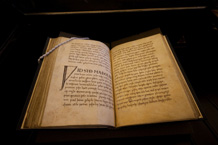
The Exeter Book is one of Exeter Cathedral’s greatest treasures
University of Exeter expert welcomes UNESCO status for rare historical document
One of Exeter Cathedral’s greatest treasures – and the focus of new research by a University of Exeter expert – has been honoured for its ‘outstanding significance’ to British history.
The Exeter Book, one of Exeter Cathedral’s greatest treasures, has been granted UNESCO Memory of the World status, signalling its ‘outstanding significance’ to British and world history.
The Exeter Book is an anthology of poetry in Old English, written down around 970 AD, and is one of only four surviving major poetic manuscripts in Old English. It is the largest collection now in existence. UNESCO describes the Exeter Book as the “the foundation volume of English literature, one of the world’s principal cultural artefacts”.
The Exeter Book is carefully stored at Exeter Cathedral and displayed at regular open days. Professor Emma Cayley, Associate Professor of Medieval Literature, in partnership with Professor Elaine Treharne and Dr Benjamin Albritton at Stanford University in the USA, is developing an app which will allow the Exeter Book to be accessible to the public all the time.
Professor Cayley said: “This recognition now puts the Exeter Book in the same category as the Magna Carta, the Bayeux Tapestry, the Book of Kells and the Diary of Anne Frank in terms of its significance. It is so important that the book remains here in Exeter, where it has been housed for almost a millennium.
“We hope the app will bring this wonderful book to life for more people.”
The Memory of the World Programme recognises documentary heritage deemed by a panel of experts to be of outstanding significance to the UK.
The Exeter Book has been at the Cathedral since the 11th century. It was the gift of Exeter’s first bishop, Leofric, who died in 1072, and contains some 40 poems of different lengths, of different types and ages. Significantly it also includes nearly 100 poetic riddles, virtually all of those in Old English which have survived.
Cathedral Librarian Peter Thomas said: “There are many treasures in Exeter Cathedral Library and Archives, but as Cathedral Librarian for many years I have always known that the 10th century Exeter Book of Old English Poetry is the most remarkable of them all.
“Poetic manuscripts in Old English are extremely rare – only four survive in the world – and the Exeter Book is the most varied, the best preserved and probably the oldest of them.
“The book was presented by Exeter’s first bishop and has been kept at the cathedral since at least the 11th century but its importance is worldwide. It is the foundation volume not only of the Cathedral Library but also arguably of English literature itself, one of the major contributions to world culture.
“As a member of the Cathedral and Archives team I feel very gratified to have played a part in achieving such recognition for this unique manuscript.”
Exeter Cathedral’s Canon Librarian, Ann Barwood, said: “It is interesting to note that it was not until the 19th century that the Exeter Book began to receive the attention it had deserved for centuries. I hope that this new award will help more people to learn of its importance to English literature and culture.”
Exeter Cathedral’s Library and Archives were substantially refurbished in 2011, to provide environmentally controlled storage for the library and archive collections. Regular open afternoons for visitors to see and learn more about the Exeter Book are held at the Cathedral’s Library and Archives. The next open afternoon will be on 6 July, and a prototype of the app will be on display. For more details visit Exeter Cathedral website.
Date: 21 June 2016
